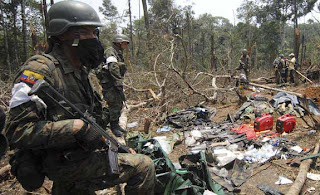 |
| A Colombian soldier in FARC leader Raul Reyes' camp in 2008. (Photo: Cambio.com.co) |
Sound familiar?
I don't mean the United State's successful operation against bin Laden's Pakistan hideout this week, but rather Colombia's 2008 raid against FARC 'foreign minister' Raul Reyes' camp in Ecuador.
Alvaro Uribe, who was president at the time, and Juan Manuel Santos, then the defense minister, must be feeling a bit vindicated these days in light of the U.S.'s success with a similar tactic.
Like the killing of bin Laden, the Colombian raid was seen as a great blow against a terror group. And, around the same time the government killed several more top FARC's leaders, and the group's founder Manuel Marulanda died of old age.
Afterwards, both Ecuador and Venezuela broke diplomatic relations with Colombia and Venezuela Pres. Hugo Chavez even talked war. But they've since made up, and Ecuador's president is even visiting Colombia right now, to inaugurate a book fair.
However, in contrast to what many American hope will follow the death of bin Laden, the deaths of Reyes and other FARC leaders did not destroy the guerrilla group, which is weakened but continues operating in remote parts of Colombia, where it profits from the cocaine trade and attacks government forces.
In many ways, the FARC would seem to be an easier organization to defeat than al Qaeda: The FARC are mostly restricted to one nation, Colombia; they have no religious fanaticism (or suicide bombers), and their Marxist class ideology seems greatly weakened. And the FARC's refuges in Venezuela and Ecuador seem recently to have become less friendly to them.
Nevertheless, despite great strides by the government, the FARC appear capable of hanging on for quite a while longer, if not indefinitely.
One reason for the FARC's staying power, and one thing they have in common with al Qaeda, is a huge source of guaranteed income: in the FARC's case, cocaine money, and in al Qaeda's, heroin. (In fact, lots of Colombia's one-time poppy production shifted to Afghanistan after the U.S. invasion. I wonder which terror group Washington would prefer to receive the illegal income?)
The lesson: Colombia's learned that these groups are flexible, resourceful and not necessarily dependant on specific leaders. I suspect the same's true of al Qaeda.
By Mike Ceaser, of Bogotá Bike Tours




No comments:
Post a Comment